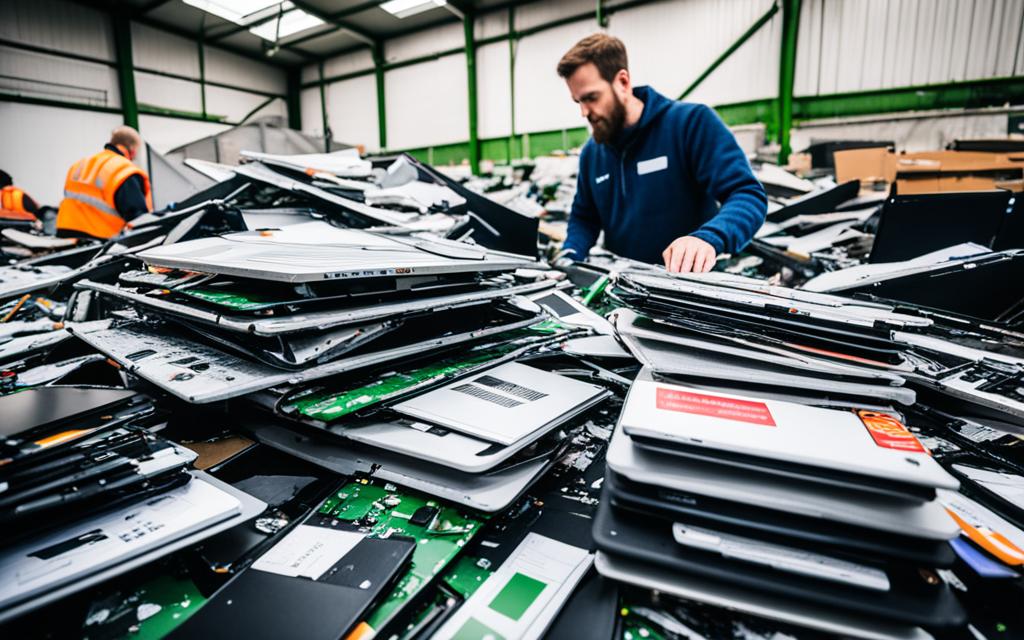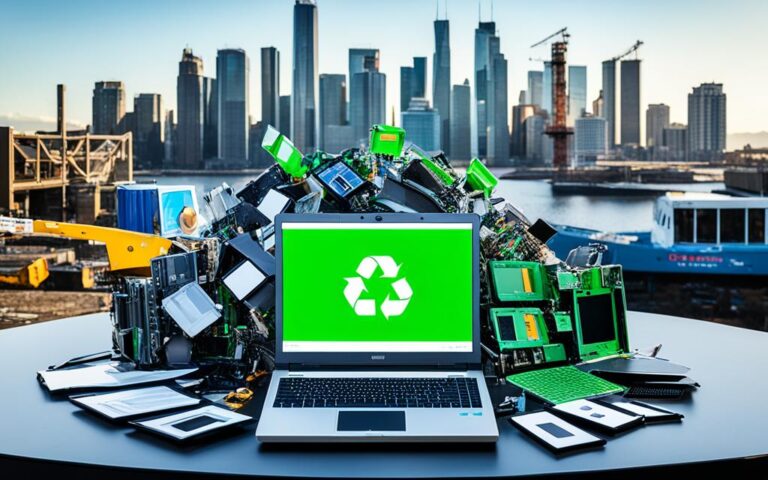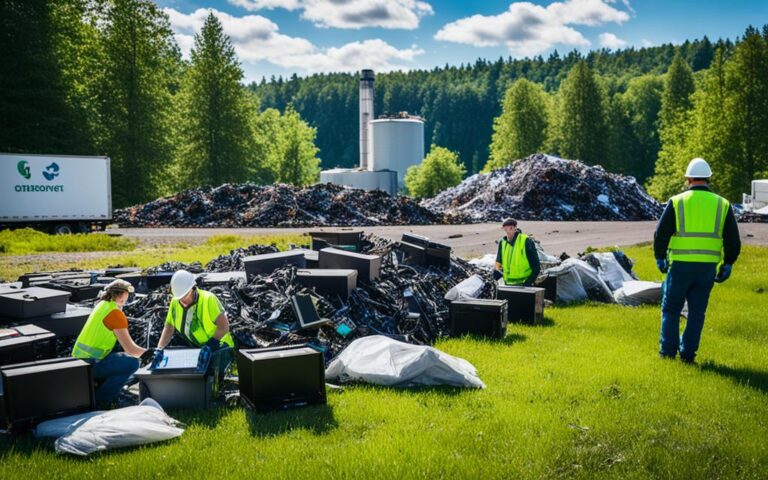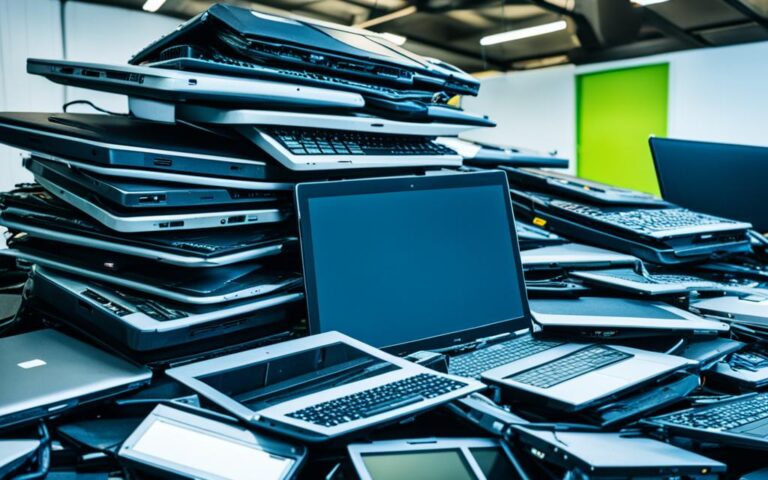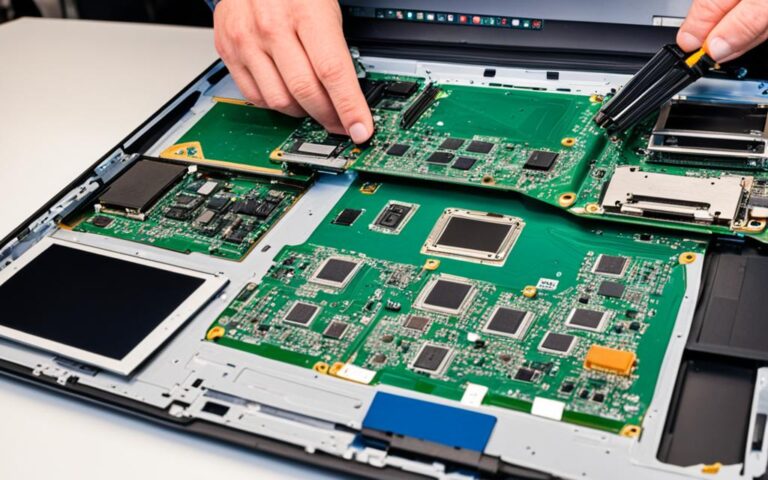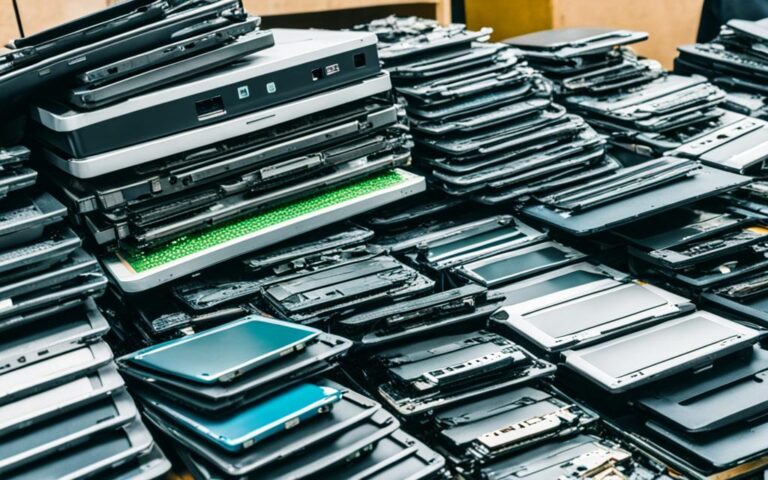How to Navigate the Challenges of Laptop Screen Recycling
Recycling an old laptop or computer is crucial to keep it out of landfills and give it a new lease of life. However, there are several challenges when it comes to recycling laptop screens in the UK.
One of the primary challenges is securely removing personal data before recycling. It is vital to ensure that no sensitive information remains on the device. This can be done by factory resetting the laptop and using data-shredding software to permanently erase the data.
Another important consideration is the option to physically remove the hard drive for added security. By taking this extra step, you can have peace of mind knowing that your personal data is completely removed.
When it comes to finding recycling options, there are different routes to explore. Retailers often have trade-in and recycling services, even if you didn’t purchase the device from them. Computer recycling schemes and charities also provide free collection and secure data wiping services.
As a responsible consumer, it is essential to choose a trusted source for recycling and be aware of the regulations set by retailers and local councils. By navigating these challenges and adopting sustainable practices, we can help protect the environment and minimize the impact of laptop screen recycling in the UK.
The Impact of Electronic Waste and the Right to Repair
The electronics industry generates a significant amount of electronic waste globally, including laptops. In the UK, electronic waste is a major concern, contributing to environmental issues. The lack of repairability in many electronic devices is a key challenge. The European Union has implemented measures to improve repairability and recyclability, and there is an opportunity for the UK to go further. Public support exists for resource efficiency and repairability. Increasing rates of recycling can significantly reduce carbon dioxide emissions. It is important for technology companies to prioritize recyclability and encourage effective recycling of components.
Electronic waste, commonly known as e-waste, poses a significant environmental problem globally. With the rapid advancement of technology and the constant release of new electronic devices, the amount of e-waste generated continues to grow at an alarming rate. Laptops, in particular, are a major contributor to this waste stream.
One of the key challenges in managing electronic waste is the lack of repairability in many devices. The trend of producing devices that are difficult, if not impossible, to repair not only leads to an increase in e-waste but also hinders the adoption of more sustainable practices. However, there is hope for change.
The European Union has recognized the importance of repairability and recyclability and has implemented measures to address these issues. By prioritizing repairability and encouraging the effective recycling of components, the EU is taking significant steps towards reducing electronic waste. The UK has an opportunity to follow suit and further advance resource efficiency and repairability within its own borders.
There is a growing public awareness and support for the right to repair and resource efficiency. Consumers are recognizing the importance of being able to repair their electronic devices, not only to extend their lifespan but also to reduce waste and minimize their environmental impact.
The Environmental Impact of Electronic Waste
The improper disposal of electronic waste has severe consequences for the environment. Many electronic devices contain hazardous materials such as lead, mercury, and cadmium, which can leach into the soil and water, posing a threat to human health and the ecosystem.
In addition, electronic waste contributes to the emission of greenhouse gases. The production, transportation, and disposal of these devices require a significant amount of energy, leading to carbon dioxide emissions and exacerbating climate change.
By increasing rates of recycling and promoting repairability, we can significantly reduce the environmental impact of electronic waste. Proper recycling ensures that valuable materials are recovered and reused, reducing the need for raw material extraction. It also helps to minimize the release of harmful substances into the environment.
The Need for Responsible Recycling and Consumer Awareness
Responsible recycling is paramount when it comes to laptop screens to prevent environmental harm. However, globally, the recycling rate for electronic waste remains alarmingly low, posing a significant challenge.
Many electronic devices, including laptops, contain valuable materials such as gold, silver, and various metals that can be recovered through recycling. By responsibly recycling these devices, we can not only protect the environment but also ensure the efficient utilization of these valuable resources.
Technology companies play a crucial role in this process. They need to shift their focus towards creating products that are designed with recyclability in mind. The integration of more sustainable materials and standardized recycling processes can greatly improve the overall recycling rate.
To address concerns about personal data security during the recycling process, trusted recycling initiatives have emerged. These initiatives employ strict data wiping procedures to safeguard sensitive information. By choosing such trusted recycling options, consumers can confidently recycle their old laptop screens without the worry of compromising their personal data.
Consumer awareness also plays a vital role in responsible recycling. It is essential for individuals to be conscious of their purchasing habits and choose products that are built to last longer. By opting for high-quality devices, consumers can reduce the demand for new laptops, thereby minimizing electronic waste generation.
Embracing consumer awareness and responsible recycling practices allows us to make a significant impact on reducing electronic waste. By collectively contributing to a more sustainable future, we can preserve our environment for generations to come.
Recycling Options for Laptop Screens in the UK
When it comes to disposing of old laptop screens in the UK, there are several recycling options available. Whether you purchased the device from them or not, popular retailers like Apple and Currys offer trade-in and recycling services. This provides a convenient and environmentally friendly way to get rid of your old laptop screens.
Under UK law, retailers have a legal obligation to provide take-back services or contribute to the cost of local recycling services when a new device is purchased. This means that even if you didn’t buy your laptop from a specific retailer, you can still take advantage of their recycling programs.
For those who prefer to go beyond the retail options, computer recycling schemes and charities such as WeeeCharity offer additional avenues for recycling. These organizations often provide free collection services, ensuring that your old laptop screens are properly disposed of and any personal data is securely wiped.
Local councils may also have their own recycling schemes or offer collection services for a fee. It’s worth checking with your local council to see what options are available in your area. This way, you can ensure that your laptop screens are recycled in accordance with local regulations and environmental standards.
| Recycling Options | Details |
|---|---|
| Retailers (e.g., Apple, Currys) | Trade-in and recycling services for laptop screens, regardless of purchase origin. |
| Computer recycling schemes and charities (e.g., WeeeCharity) | Free collection and secure data wiping services. |
| Local councils | May offer recycling schemes or collection services for a fee. |
Selling or Donating Old Laptop Screens
When it comes to getting rid of your old laptop screens, selling or donating them is a great option. Not only will you be able to declutter your space, but you’ll also be contributing to a more sustainable and circular economy by extending the life of these devices.
There are various avenues you can explore when selling your old laptop screens. High-street tech-buying retailers like CeX and musicMagpie offer convenient options that allow you to sell your devices in-store or online. These retailers often provide free postage for sending in your items, making the process hassle-free.
If you prefer to donate your laptop screens, platforms like Freecycle Network provide a platform to connect with individuals or organizations in need. By giving away your old machines through these platforms, you can ensure that they find a new home where they’ll continue to be used and appreciated.
Another option for donating your old laptop screens is to gift them to friends or relatives who can still make use of the device. This option is particularly valuable if the laptop is still receiving regular software and security updates, ensuring that it remains functional and secure for the recipient.
However, before parting ways with your old laptop screens, it is crucial to take steps to protect your personal data. Ensure that all sensitive information is securely wiped from the device to prevent any potential data breaches. This can be done by following recommended data wiping methods or by seeking professional assistance if necessary.
The Benefits of Selling or Donating Old Laptop Screens:
- Reduces electronic waste by giving devices a second life
- Contributes to a more sustainable and circular economy
- Allows others to access affordable technology
- Promotes resource efficiency and reduces the demand for new devices
“Selling or donating your old laptop screens not only helps you declutter, but also supports a more sustainable and circular economy.” – [Your Name]
Conclusion
Laptop screen recycling poses significant challenges in the UK, including the secure removal of personal data, the lack of repairability, and low recycling rates. To ensure responsible recycling, individuals must take proactive measures to securely erase personal data before disposing of their old laptops. They should also prioritize responsible recycling options to minimize the impact on the environment.
Fortunately, there are various recycling options available in the UK. Retailers, computer recycling schemes, and charities offer opportunities for proper disposal and recycling of old laptop screens. By utilizing these resources, individuals can ensure that their electronic waste is handled responsibly and sustainably.
To address the challenges of laptop screen recycling, consumers need to be more aware and make informed purchasing decisions. By choosing products that are designed to last longer and require less frequent upgrades, consumers can contribute to the reduction of electronic waste. Increasing consumer awareness of the importance of recycling and the potential environmental consequences of improper disposal is crucial in promoting responsible practices.
By adopting sustainable practices and making responsible choices, we can all play a part in minimizing the impact of laptop screen recycling on the environment. Together, we can protect our planet and create a more sustainable future by reducing electronic waste and promoting responsible recycling.
FAQ
How can I securely remove personal data from my old laptop screen before recycling?
Personal data can be securely removed by factory resetting the device and using data-shredding software. It is also advisable to physically remove the hard drive for added security.
What are the options for recycling old laptop screens in the UK?
In the UK, you can recycle old laptop screens through retailers like Apple and Currys, computer recycling schemes, and charities like WeeeCharity. Some local councils may also offer recycling schemes or collection for a fee.
Can I trade-in or recycle my old laptop screen even if I didn’t purchase it from a particular retailer?
Yes, retailers like Apple and Currys offer trade-in and recycling services for old laptop screens, even if you didn’t purchase the device from them. They are legally obliged to provide take-back services or contribute to the cost of local recycling services when a new device is purchased.
How can I sell or donate my old laptop screen?
Tech-buying high-street retailers like CeX and musicMagpie accept used devices and provide free postage for sending them in. Online platforms like Freecycle Network offer a way to give away old machines. You can also consider donating to friends or relatives who can still use the device, as long as it is receiving software and security updates. However, make sure to securely wipe personal data before selling or donating any device.
What are the challenges in laptop screen recycling?
The challenges in laptop screen recycling include the need for secure data removal, the lack of repairability, and low recycling rates.

